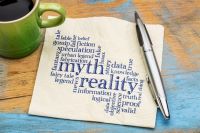
What’s junk science? It’s “pseudo-science.” It’s when someone or some group with an agenda uses – or references – poorly done research to attempt to prove a point they want to make.
It’s also when such persons or groups twist the conclusion of good research to fit an agenda. It’s misleading but it happens all the time in news stories. At best, junk science is misleading. When it’s intentional, it’s almost fraudulent.
A Voice of Reason
To help sort out all the consumer confusion caused by junk science, the American Society of Nutrition, the American College of Nutrition, and the Academy of Nutrition and Dietetics formed a partnership called the Food and Nutrition Science Alliance. The Alliance developed a list of “Ten Red Flags of Junk Science” examples, according to Tufts University:
- Promises of a quick fix or cure
- Dire warnings about a single product or dietary regimen
- Claims that sound too good to be true
- Simplistic conclusions drawn from a complex study
- Recommendations based on a single study
- Statements refuted by scientific organizations
- Lists of “good foods” and “bad foods”
- Recommendations made to help sell a product
- Recommendations based on studies that have not been peer-reviewed
- Recommendations from studies that ignore differences among individuals or groups
As they relate to monosodium glutamate (MSG), let’s focus on red flags #2, #4, and #7.
Dire Warnings and Recommendations based on a Single Study
It’s hard to believe, but it was a single letter written by a physician back in 1968 and published in a medical journal. He described symptoms shortly after eating in a Chinese restaurant. Since Chinese cuisine was known to use MSG, warnings came out to avoid it, despite a lack of evidence then and a lack of evidence since.
Chinese restaurants everywhere started omitting MSG from their dishes (despite decades of inclusion and satisfied diners) and featuring the “No MSG” claim on their take-out menus.
This is where junk science comes in: no one prior to that 1968 letter had complained about “Chinese restaurant syndrome” symptoms. Chinese food was being enjoyed by millions. But when they were “informed” about CRS suddenly loads of people had it.
Simplistic Conclusions Drawn from a Complex Study
FACT – The “G” in “MSG” is for glutamate. Your body makes glutamate and it’s present in every single protein food you eat. It’s the most prevalent amino acid in your gut and tied intricately to a well-functioning immune system. You wouldn’t want to avoid it.
All the credible studies on glutamate have shown safety, not harm. There’s just no “there” there when it comes to any problem with glutamate. Indeed, all the complex, well-done studies, both human and animal, have shown no problems with glutamate at normal consumption levels.
FACT – The amount of glutamate used in cooking is only a tiny portion of the glutamate we eat every day that’s naturally present in our food and that we’d get even if we never touched MSG.
FACT – Dozens of studies on the effect of glutamate – whether as “MSG” or free glutamate, have shown it is safe.
Lists of “Good Foods” and “Bad Foods”
As a clinician of nearly 40 years, I’d much rather spend my time helping people understand how to have a delicious – and healthy – eating style and be more physically active – things that really make a difference to their health, instead of dispelling junk science about glutamate. The power of suggestion is strong, but as a healthcare professional, I have to be stronger to combat it.
Have you been avoiding glutamate? It’s naturally present in some of the most delicious foods. Tomatoes, mushrooms, Parmesan cheese, and eggplant – think Mediterranean cuisine, but others, too – are full-on warehouses of glutamate. Again, it’s the same glutamate as in MSG.
No one ever complained about “Italian/Japanese/Mediterranean/Other restaurant syndrome,” and it’s time to give a rest to Chinese Restaurant Syndrome.
Pass the Moo-shu, please.
 Read more about sound science vs junk science.
Read more about sound science vs junk science.

